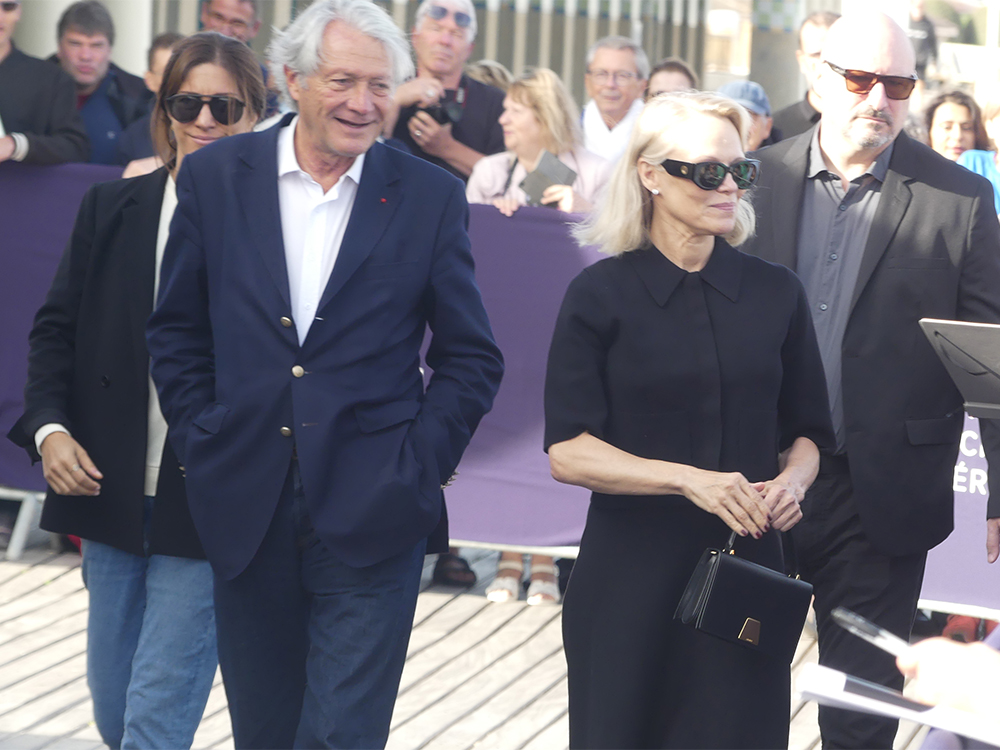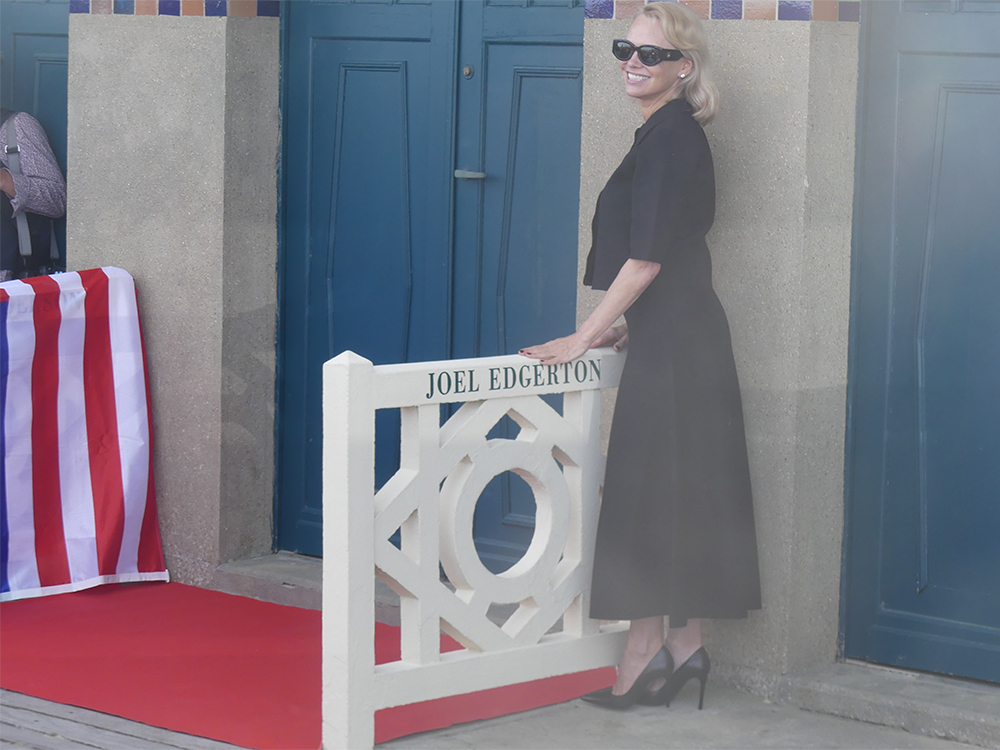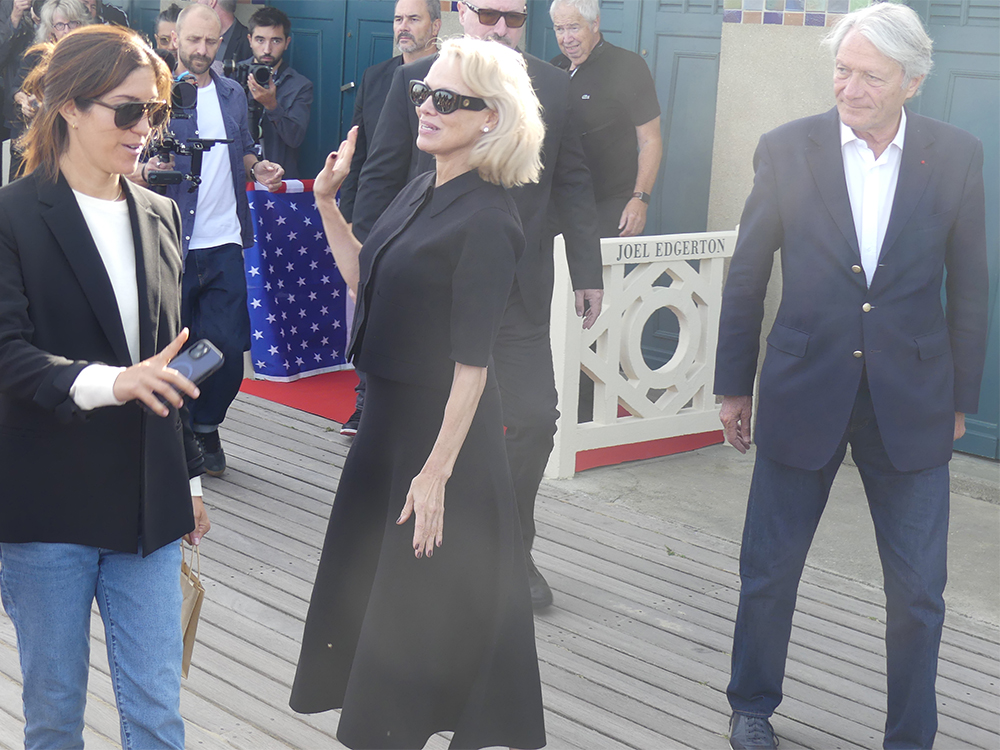Festivals - Deauville 2025: Pamela Anderson inaugurates her beach cabin
By Mulder, Deauville, Les planches, 06 september 2025

On September 6, 2025, the iconic Planches of Deauville witnessed one of those moments that effortlessly blend popular culture and artistic legacy. At precisely 10 a.m., Pamela Anderson stepped forward to inaugurate her beach cabin, a ritual that has become a mark of distinction for American cinema at the festival. Hundreds of fans had gathered in anticipation, some reminiscing about her legendary role as C.J. Parker in Baywatch, others curious to see how the actress, now in a period of career resurgence, would carry herself in such a setting. Her words, a simple yet glowing “It’s Wonderful!”, encapsulated the spirit of the moment. Positioned near Deauville’s symbolic lifeguard hut, the cabin paid direct homage to her Californian persona and the global phenomenon that made her name, but it also invited a more nuanced reading: this was less about nostalgia and more about reclaiming her narrative as an actress in full artistic bloom.
For decades, Pamela Anderson had been reduced in the public eye to her physical image, media scandals, and the hyper-visible celebrity culture of the 1990s and early 2000s. While Baywatch catapulted her into stardom, her name became entangled with tabloid controversies and the infamous stolen videotape with her then-husband Tommy Lee, a violation that shadowed her attempts to be taken seriously as a performer. Yet the 2020s marked an unexpected but deeply compelling turning point. Her Broadway debut in 2022 as Roxie Hart in Chicago surprised critics with a poised, magnetic performance, showing a side of her few had expected. Then came the 2023 Netflix documentary Pamela, a Love Story and her candid autobiography Love, Pamela, both projects offering her the chance to speak in her own voice, free from the distortions of gossip or unauthorized dramatizations like Hulu’s Pam & Tommy. These works reframed her legacy, presenting a woman who had endured, redefined herself, and sought artistic depth over sensational headlines.

That trajectory crystallized in 2024 when director Gia Coppola cast her in The Last Showgirl. The film, a quiet drama exploring resilience and faded glamour, became the role of a lifetime for Pamela Anderson. Her portrayal of Shelly was hailed by critics as revelatory: Caryn James of the BBC described her performance as “a revelation,” while David Rooney of The Hollywood Reporter noted its transformative power, calling it “undeniably affecting” and a turning point in her artistic journey. For the first time in her career, she earned nominations at the Golden Globes and the Screen Actors Guild Awards for Best Actress. Standing in front of her beach cabin in Deauville, these accolades were present in the subtext of the event—what could once have been dismissed as a nostalgic tribute now read as an acknowledgment of an actress in the midst of a creative renaissance. The applause was not merely for C.J. Parker, but for Shelly, Roxie Hart, and the many layered performances that have since followed.
The symbolic resonance of this new chapter is profound. Deauville, with its history of honoring American stars across generations, seemed to recognize that Pamela Anderson has moved beyond the caricature of the past. Her recent projects, from The Last Showgirl to the 2025 legacy sequel The Naked Gun, confirm her ability to traverse comedy, drama, and self-parody with renewed confidence. More importantly, she has embraced roles that foreground authenticity, vulnerability, and strength—themes that resonate with her personal story of survival, reinvention, and activism. Seen through this lens, the inauguration of her beach cabin was less about enshrining a sex symbol and more about celebrating an actress who has fought her way into being heard on her own terms.

What makes this transformation particularly compelling is the way Pamela Anderson has balanced her return to acting with a growing influence as a cultural figure beyond the screen. Her plant-based cooking show Pamela’s Cooking with Love and her cookbook I Love You: Recipes from the Heart—nominated for a James Beard Award in 2025—reflect not just a celebrity lifestyle pivot, but a genuine dedication to causes she has long championed, from animal rights to sustainable living. Her presence in Deauville therefore resonated on multiple levels: the cabin was a nod to her cinematic legacy, but also a marker of her broader cultural influence, one that spans theater, film, literature, activism, and even culinary art. This multi-dimensionality challenges the reductive narratives that long defined her, and the Deauville audience seemed fully aware of it.
In the end, the inauguration of Pamela Anderson’s beach cabin was more than a ceremonial gesture. It became a symbolic coronation of her artistic rebirth, set against the backdrop of a festival that prides itself on bridging Hollywood glamour with European appreciation of cinema as art. For longtime admirers, it was a chance to reconnect with the sunlit iconography of Baywatch. For critics and cinephiles, it was a reminder that reinvention in cinema is always possible, even for those once dismissed as stereotypes. And for Pamela Anderson herself, it was a quiet but powerful affirmation: that the girl from Ladysmith, once underestimated and objectified, now stands on the Planches of Deauville not just as a star, but as a serious artist finally given her due.

You can discover our photos in our Flickr page
Photos and video: Boris Colletier / Mulderville

